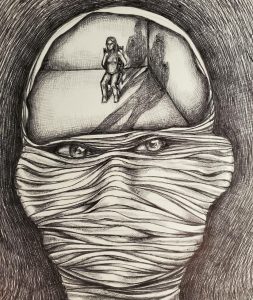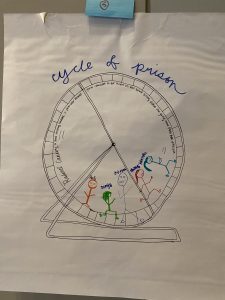2 organization as psychic prison
“Culture gives us our world. And it traps us in that world! The psychic prison metaphor alerts us to pathologies that may accompany our ways of thinking and encourages us to question the fundamental premises on which we enact everyday reality” (Morgan, 211).
part 1. What is your concept of prison?
What images are brought to your mind when you hear the word prison? Of course, in the most literal way, one of the first pictures should be of an actual prison. Metal bars across the cell. Orange jumpsuits. The sound of a jailcell being locked shut.
Go a step further and try to come up with other, perhaps more metaphorical, constructions of a prison. What does that look like for you?
Prisons can look like immigration detention centers. People held against their will in an unfamiliar space forced to comply or else they face severe consequences. This fear is confining.
Or, perhaps prisons can look like a stereotypical public high school in America, where what you wear is monitored and when you can eat is controlled.
Maybe, your mind is a prison…

In this chapter, we will focus on organizations as a psychic prison, explain the main components of a psychic prison, discuss why this metaphor is relevant and applicable, and show how the metaphor is used in pop culture.
part 2. the unconscious
Plato’s allegory touches on conscious thinking but what happens when we move past that and into the unconscious.
By delving into the unconscious however, we come across many unseen barriers. We do not know what lies in our unconscious mind, therefore, we cannot act to break these invisible chains.
“In highlighting the role of the unconscious in organization, there is a danger that many will now want to find ways of managing the unconscious as well. This, of course, is impossible, because the unconscious is by nature uncontrollable” (Morgan, 240).
Is it possible to break free of our psychic prisons?
Exercise 1: Think about a dream…
Think about the most vivid dream you have had. Analyze it a little… Why do you think you dreamt that? What outside factors might have influenced your subconscious? What impact did it have on your life? Did it maybe motivate you to act upon something?
| Repression: “pushing down” unwanted impulses and ideas into the unconscious
Denial: refusal to acknowledge an impulse- evoking fact, feeling, or memory Displacement: shifting impulses aroused by one person or situation to a safer target Fixation: rigid commitment to a particular attitude or behavior Projection: attribution to one’s own feelings and impulses to others Introjection: internalizing aspects of the external world in one’s psyche |
Rationalization: creation of elaborate schemes of justification that disgust underlying motives and intentions
Reaction formation: converting an attitude or feeling into its opposite Regression: adoption of behavior patterns found satisfying in childhood in order to reduce present demands in one’s ego Sublimation: Channing basic impulses into socially acceptable forms Idealization: playing up the good aspects of a situation to protect oneself from the bad Splitting: isolating different elements of experience, often to protect the good from the bad |
(Morgan, 215)
The chart above lists defense mechanisms that we do in order to keep our unconscious impulses or instincts at ease. Because who you are shapes what your organization is like. We know that organizations are influenced by their environment but Freudian theory adds another competent.
Organizations are shaped by its members unconscious.
part 3. Organizations As Psychic Prisons
What is a psychic prison?
“organizations are ultimately created and sustained by conscious and unconscious process, with the notion that people can actually become imprisoned in or confined by the images, ideas, and actions to which these processes give rise” (Morgan, 207).
Here is a quick video on the brief summary of organizations as a psychic prison: https://www.youtube.com/watch?v=i_95qOlsrv0
Organizational theorist Gareth Morgan discusses the framework of organizations as psychic prisons to help us understand how people in organizations get trapped by conscious and unconscious processes that carry hidden meanings (Morgan, 208). These change-resistant processes create shared meaning in the organization; ways of seeing become ways of not seeing “blind spots” in the organizational structure (Morgan, 209).
While the processes are socially constructed, they exercise significant control over all organizational actors through group illusions that produce conformity and assumed consensus (Morgan, 211). This is referred to as groupthink, as psychological phenomenon where members of a group desire conformity. Being confined in psychic prisons discourages creativity and individuality, restricting us to groupthink. Thus, the strengths and victories of the organization can actually turn into the organization’s weaknesses that ultimately lead to its downfall (Morgan, 209).

Exercise 2: think about the organizations that you are a part of…
What group illusions and favored ways of thinking are present?
How do these unconscious processes create shared meanings? What truths do these meanings disguise?
What “blind spots” exist? How do they produce conformity and assumed consensus within the organization?
Do you agree with Morgan that group illusions and “blind spots” are an inevitable part of organizational processes? How can we reconceptualize these blind spots when trying to see the good and beauty in our organizations?
part 4. power
part 4a. the patriarchy
It is not controversial to say that organizations are male dominated. And the ones that aren’t male dominated, are due to the feminine functions they serve: support, flattery, entertainment.
“From their standpoint, patriarchy operates as a kind of conceptual prison, producing and reproducing organizational structure that give dominance to males and traditional male values” (Morgan, 218).
Do you think one could argue that gender is a type of psychic prison? Is gender performance different than gender?
part 4b. knowledge
Math, such as Calculus, is not universal, it’s just another way to understand the universe. However, because it is taught at the academy, it is believed to be universally true.
Indigenous knowledge, does the same thing. They represent the world but they are understood to be untrue differences in belief that offshoot from the official knowledge. As a result they are relegated into the world of culture and seen more closed than the so-called universal and objective knowledge… which really just is knowledge with power.
Who do you think created psychic prisons? Who does psychic prisons benefit… if any?
part 5. the role of culture in psychic imprisonment
Morgan writes about the creation of culture as peoples’ attempt to locate themselves in something that is more enduring than themselves (Morgan, 220). This idea suggests that culture acts as a defense system that allows us to believe that we are more powerful than we actually are in reality (Morgan, 220). In organizations, common values within the organizational culture are rooted in the shared concerns of organizational participants, these concerns are often hidden from conscious awareness (Morgan, 226). Central to these common values is the construction of unity which is created out of conceptions of an enemy or threat, an us vs. them relationship (Morgan, 226).
“Humans live their lives as prisoners or products of their individual or collective psychic history” (Morgan, 212).
Is your workplace a psychic prison? Perhaps your school?

How might your place of work relate to the idea of organizations as a psychic prison?
While many of us come from different backgrounds, do you recognize an assumed consensus in how students are expected to navigate their studies and interact with other students, professors, and staff? Is there a certain archetype that students are expected to adopt? Schools often boast about the success of many students, but how often are the “successful” students those that come from privileged backgrounds? There is an idea that academia is a system that is designed to empower a select few and elevate them as the successful young professionals while invisibilizing the needs of the majority of students who were not provided with the same tools to navigate the academic system. Playing into capitalist tropes, the system consumes the time and resources of students that it intends to disadvantage; academia is not designed for the success of the masses.

Exercise 3: Questions to consider as members of organizations…
How does whiteness play into who is considered a “successful” young professional at your workplace, college, school, or organization? How does class privilege play a role? What role does gender play?
How does the invisibilization of certain populations relate to the concept of organization as psychic prison? What individual needs are going unmet at your organization? How is this reflective of an organizational “blind spot”?
Where can we see us vs. them dialogue at your organization? How does this narrative reinforce the psychic prison?
How do we break the simulation? Has the simulation already been broken? Who plays a role in this un-seeing process?
part 6. music as an escape
Art and music has always been our way to provide commentary on the state of the world. When things feel like they are isolating, you can always turn to your favorite artist to reassure you that you are not alone.
Below is a curated playlist that all revolve around the psychic prison metaphor. Some songs deal with the psychic prison being their mind. Other songs see politics as a psychic prison.
Most songs are explicit. There are mentions of sexual violence and police brutality.
https://open.spotify.com/playlist/3anzB2z8rE5R2oCX4gT2It?si=ap0QA4B6SUSokGmHys7xyw
I must express appreciation and gratitude to my partner, Danny, who put this playlist together for me.
part 7. once we recognize how we operate within a psychic prison, how do we change?
One limitation of Morgan’s theory of organization as psychic prison is the utopian characteristics of the promise of liberation from undesirable cognitive and psychological constraints; we may never truly be free from collective illusions. However, we can still be active agents of change in our organizations. Morgan writes about the Theory of Transitional Phenomena: in situations of voluntary change, the person who is actively creating the change must be in control of the process because the transformation hinges on conceptions of what makes up conceptions of “me” and “not me” (Morgan, 229). How do deconstruct this binary relationship to see and then reconceptualize our psychic prison?
Exercise 4: breaking through the psychic prison
How can we actively take control of changing the “blind spots” in the organizations we are involved with? How do we liberate ourselves and others from psychic prisons? What is our role in this process?
“To make change we must first free ourselves from our own psychic prisons”
“Organizations are shaped not just by their environments. They are also shaped by the unconscious forces shaping the societies in which they exist” (Morgan 217).
We hope by the end of this chapter, you have an awareness of the psychic prisons that are a part of your life. We understand that you will not break out of these psychic prisons overnight, but we hope you can take some time and challenge yourself to consider some of these situations:
- If you are in a workplace where groupthink is at play, what should you do?
- If you encounter a situation where you feel inadequately informed, how do you proceed? Do you take charge or do you conform to those around you?
- Think of an organization you are a part of and how can you diverge from structural norms that said organization champions?
We would like to acknowledge and thank the first creators of this chapter: Esma Dollaku and Ari Wood for their wisdom and efforts put into this. This chapter has been edited by: Shay Reifert, Makana Shipman, Shanthi Ashley, Diego Villegas, and Emily Anderson. We hope you enjoy and take what resonates with you.
Citations
Bauer, J. (Writer), & Bauer, J. (Director). (2014, April 27). What is Real? (Plato’s Allegory of the Cave) [Video file]. Retrieved October 8, 2020, from https://www.youtube.com/watch?v=lVDaSgyi3xE
Gough, David. “Incarceration.” Art, 0AD, www.davidgoughart.com/.
Morgan, G. (1997). Chapter 7: Exploring Plato’s Cave. In Images of organization. London: SAGE.
